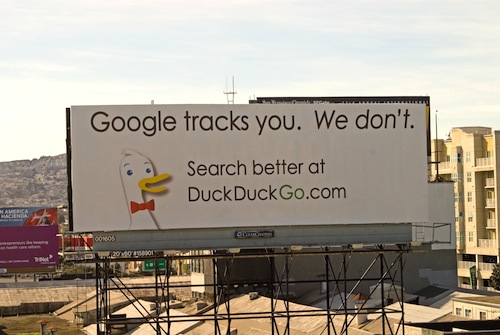
Update, 1/20/11, 10:40 a.m.: Added encryption detail from Google.
On the heels of our coverage of Valley Forge search engine company Duck Duck Go’s new marketing strategy that plays off of Google’s targeted advertising technology and its inherent tracking capacity, founder Gabriel Weinberg has taken the message straight to San Francisco.
This week, the company unveiled a billboard promoting its DontTrack.Us campaign along the Bay Bridge, reminding drivers and passengers that Google’s use of advertising targeting technologies allegedly puts users at risk for identity tracking, third-party profile building and search history leaks.
But Google responded promptly this morning to an e-mail for comment.
“It’s unfortunate that DuckDuckGo is preying on people’s fears and offering incomplete information in order to garner attention,” wrote Google’s Christine Chen, Senior Manager of Global Communications and Public Affairs.
Chen refuted DontTrack.US’s example of Google’s tracking of user search terms, which could include sensitive, private terms.
“It is inaccurate to say that Google uses sensitive health-related terms to target ads on affiliated web pages,” she says. “We recognize our responsibility to protect the data that users entrust to us and we give them meaningful choices to protect their privacy,” including the ability to encrypt searches.
But according to Weinberg, Duck Duck Go doesn’t “store personal information or allow search terms to be passed to sites you click on.” The site has seen an upswing in support recently from online communities like YCombinator’s Hacker News and from users seeking consumer-focused alternatives to mainstream online tools.
Duck Duck Go eschews the common search engine advertising revenue model and is looking to other revenue streams, like selling tickets for concerts based on search terms, Weinberg says.
Duck Duck Go takes its anti-Google privacy policy message to San Francisco







